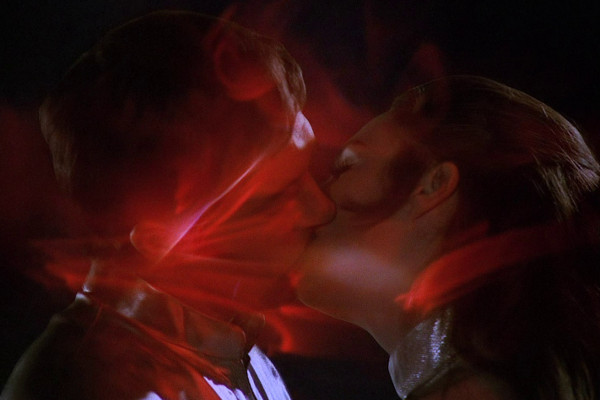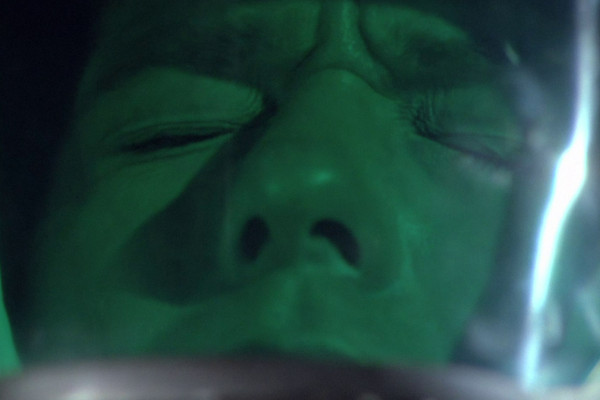


To celebrate the fiftieth anniversary a brand new look at the series has been taken, along with all-new screencaptures from the BluRay release. The series was previously ranked way back in March 2013, and while a handful of the write-ups may remain more-or-less the same, the majority are fresh new takes, including a look at the various commentary tracks and additional features that come with the series.
For anyone who should care how my opinion may have changed over the six year duration (we can all change our minds, right?) then there's also references to how much the episodes have risen or fallen in my estimation. Please join me as I (re)rank the episodes, from worst to best...

↑ Down 5 Places
Perhaps the only genuinely below-par episode of UFO, The Dalotek Affair is the series at its most tacky and inane. The idea of a private company setting up on the Moon and inadvertently threatening the security of Moonbase is a decent one, but it's clouded with slapdash production and too many childish innuendos. The cast are at their least charming here, and Straker's involvement doesn't really change a single thing, though it's telling he's able to piece together all the clues and make sense of the plot when he watches back a video clip and hears the word "balls".
The entire story is told in excruciating flashback, as Paul Foster relates the tale of a top secret security breach to Alec Freeman... in the middle of a crowded restaurant. Instead of giving every diner the "amnesia drug" he gave to the residents of the private company, he instead uses it as a kind of reverse rohypnol, using his knowledge of the company's scientists to chat up their female operative when he sees her in a restaurant some months later. It's an inexplicably amoral piece of characterisation, yet the viewers are supposed to be charmed instead of repulsed.
In an earlier review this story was five places higher, and praised as "supremely watchable garbage". It's damning the episode with faint praise, but on repeat viewings even that begrudging compliment doesn't stand up to close scrutiny.

↓ Up 1 Place
Ordeal perhaps isn't so bad if you're really in the mood for a lighter, jokier take on the show, and is more just inessential than anything else. UFO does, like many series with a 26 episode quota, struggle to make them all essential viewing. In fact, if you were being really unkind, you could suggest that half the episodes could be skipped without missing anything vital to the series.
This article will try to avoid discussing plot resolutions too much to avoid revealing any surprises, but Ordeal does - spoiler - end with a "it was all a dream" climax, meaning 27 minutes of the episode was all in one character's mind. As a result it is, by definition, a time filler, and no more. Well, unless you're a viewer who likes seeing the handsome Colonel Paul Foster (Michael Billington) with his shirt off for most of the episode, then it's a higher priority in your viewing habits.
Nineteen of the series' episodes were directed by personnel who had previously worked on Gerry Anderson's puppet-based productions, including this one. In an interview with Starlog magazine (Issue 71, 1983) Billington described the role as "moderately enjoyable", but that the directors were largely inexperienced with working with actors. "It wasn't that they were bad, it was just hard for them to contend with directing real people."

↑ Down 13 Places
The one intriguing thing about UFO is the question of what the aliens actually want. Their motivations appear to change in some episodes, and it's hard to draw any real conclusions when they can't communicate. It's one thing that makes the series so alluring, particularly that eerie, doom-laden reveal of the alien planet on the end titles. Having alien invaders who can express their intentions is one thing, but aliens landing and you don't quite know why... it's even more chilling.
E.S.P. offers some answers, with John Croxley, a man cursed by ESP who channels the aliens. Claiming they're from a dying planet and only want to survive, he also tries to shoot Straker and Freeman while under their influence, so it's questionable how much of it is truthful. Experienced actor John Stratton portrays Croxley, and, while fine, it's very much an "acting" performance, a throwback to the day when men would call each other things like "fools" and "old boy", and away from the concept of method. Although "of its time", this slightly non-naturalistic tone of acting might be regarded as hammy today, given that the concept of theatrical acting has disappeared from television in the main.
While UFO is generally a pretty well-made show, a certain suspension of disbelief has to be applied, as it operates with many different materials, ranging from Gerry Anderson models to habitual blue screen for car journeys. Anyone watching has to overlook the fact that you'll never see someone exit one of the SHADO mobile trucks, or that a UFO will never be in the same shot as a member of the cast. All of these elements detract in this instalment, particularly with an unintentionally amusing scene where sped-up footage of a cat meets a shot of a toy saucer crashing into a "house" while guest star John Stratton reacts with everything he's got. It's arguably the cheapest-looking episode of UFO, and does strain credulity. Writer Alan Fennell had also only written for Gerry Anderson's puppet shows before this, and with some corny expositionary dialogue in the final few minutes, it does show.
One thought about the series is how difficult it would be to operate undercover in today's world. Although the UFOs only ever seem to land in deserted country areas, with the age of camera phones and worldwide social media, it would be harder to keep things under wraps. If nothing else, the presence of the word "SHADO" on the side of all the trucks would surely give the game away.
George Sewell recorded a commentary track for the episode in June 2004, moderated by Jaz Wiseman. Rather than focusing specifically on the episode itself, George discusses the series as a whole, including how he was never a smoker, and tried to learn for the series so it would look realistic on screen. Sewell is light-hearted, positive and enthusiastic, but the commentary can be a little awkward to listen to as Wiseman unsuccessfully tries to prompt George for specific memories of the series. As George had either forgotten most of it, or simply enjoyed the whole experience no matter what, it doesn't bring a lot to the surface, but Sewell is likeable company. Strangely, the commentary only featured on the Australian DVD release and wasn't reproduced elsewhere.

↓ Up 2 Places
UFO's most rewarding moments come when the series tries to flesh out the characters, particularly the taciturn lead, Commander Ed Straker. Unfortunately, for every episode where the character is given depths, there's an episode like Close Up where the central figure of the series is made to look like a complete buffoon.
Close Up contains an oddly spikey relationship between Straker and a Moonbase operative, the beautiful Gay Ellis (played by Gabrielle Drake). An underdeveloped and completely out-of-character subplot features Straker making odd overtures to Gay, including his insistence that "and don't ever forget, you're a very attractive girl." However, Gay is angry with Straker all episode, and it's not clear why - it's like the episode contains an elephant in the room but no one remembered to introduce the elephant. This is all doubly strange when you consider it's written by the same man behind Computer Affair, where Straker learns that Gay is in a relationship with Mark.
Later, when Straker returns to Earth, an underling spends several moments making his superior officer look a complete cretin by explaining how a new space camera is worthless, and illustrates the point by showing him a shot of Gay's "private area", magnified several thousand times over. Straker, ever stoic, seems oddly unconcerned by two of his underlings getting together to make him look an utter fool, or the fact that Gay's crotch looks like an alien planet when seen close up. It's a thin plot for a 50 minute show, and the basic point is hammered home repeatedly before the final credits roll.
Incidentally, when this article was first uploaded it got mixed reactions from some UFO fans out there, some of whom regarded it as a bit unkind to the show in spots. I've certainly enjoyed the show a lot more on this rewatch, and toned down some elements, but it must be made clear that even my most disparaging write-ups of UFO are filled with tongue-in-cheek affection for the series, rather than genuine derision. Like any series, UFO could be incredibly variable, but even at its worst, it was never less than watchable...

→ No change
It's hard to dislike an episode as idiotic as The Responsibility Seat, a nonsense mess of a story with logic almost as haphazard as its lacklustre editing. Key scene has to be where the usually intuitive and intelligent Ed Straker has to get voice identification to prove that Jane Merrow's journalist is up to no good... despite the fact that she's previously bugged his office, ran from him, and smashed him over the back of the head with an ornament, giving him concussion and nearly killing him.
Possibly because we get ample shots of Merrow's chest in this, one of the most sexist episodes of them all, Straker is distracted and won't listen to reason until it's confirmed for him by the base computer. Merrow was frequently active in the ITC roster, and, as with her treacherous role in The Prisoner, was known for playing femme planktelles. The BluRay release contains a special feature, "The Women of UFO", wherein Merrow says she had clashes with Sylvia Anderson, who thought she was "withholding her performances" when not acting in close ups. It's a tactful way of addressing it, I guess.
The secondary story is Colonel Freeman, suffering the pressure of having to give orders in Strakers' absence, despite the fact that Straker must have taken time off before anyway and, as a Colonel, he would be used to giving orders in the first place. (In fact, this does happen, in Survival) Add to this some delirious Soviets with the worst "Russian" accents you've ever heard, and it's a mish-mash of inanity that's somehow easy to love.